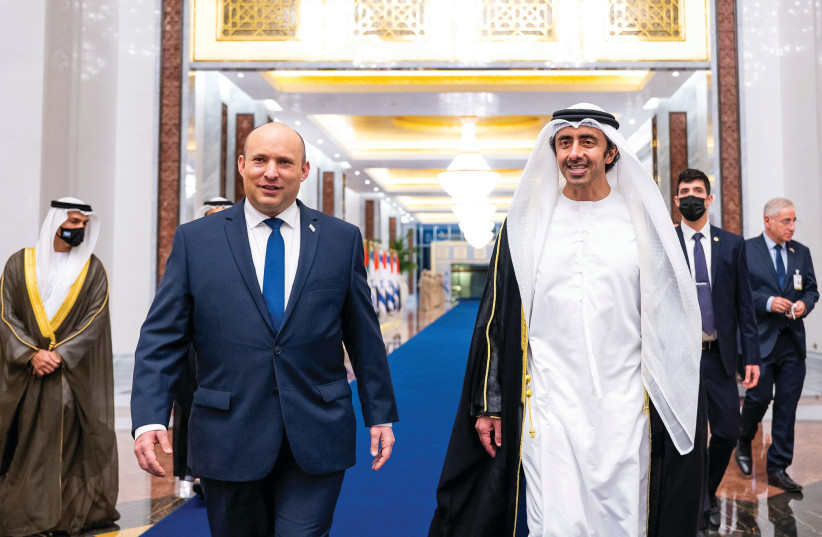It was uplifting to see the way President Isaac Herzog and his wife, Michal, were greeted yesterday in the United Arab Emirates, during the first day of their two-day tour.
Following the establishment of ties in 2020, there’s a tendency to throw around words like “historic” with every trip by Israeli officials to the Gulf but the significance of this visit should not be underestimated.
First, it is encouraging that a trip between the head of the Jewish state to the United Arab Emirates now seems so natural, since former US president Donald Trump and former prime minister Benjamin Netanyahu signed the Abraham Accords. Second, as we know, true peace needs to be between countries, not just political leaders. The Herzogs’ visit was by invitation of the de facto ruler of the UAE and the Crown Prince of Abu Dhabi, Sheikh Mohammed bin Zayed Al Nahyan (MBZ).
The presidential tour includes visits to Abu Dhabi and Dubai and the itinerary includes official meetings with MBZ; UAE Minister of Foreign Affairs and International Cooperation, Sheikh Abdullah bin Zayed Al Nahyan; ruler of Dubai, Sheikh Mohammed bin Rashid Al Maktoum; Commissioner-General of Expo 2020 Dubai and UAE Minister of Tolerance and Coexistence, Sheikh Nahyan bin Mubarak Al Nahyan; as well as representatives of the business sector and the Jewish community.
“I am bringing with me a blessing of peace and a message of peace to the entire region, to the peoples of the region. Peace brings with it prosperity, progress, and growth for the benefit of the peoples of the region,” Herzog said before his departure.

He also had special praise for the crown prince, saying: “I am grateful for his courage and bold leadership, carving out a peace agreement with Israel and sending a message to the entire region that peace is the only alternative for the peoples of the region.”
It should be kept in mind that although Saudi Arabia is not part of the Abraham Accords, the flights from Israel to the Gulf, now so routine, travel through Saudi air space, with permission from the desert kingdom. Although Israel does not have formal diplomatic relations with the Saudis, there are obvious ties that could be boosted as the relationship with the UAE and Bahrain moves forward.
According to a statement issued by the Government Press Office, Herzog visited the cockpit while flying over Saudi Arabia, looked over the Saudi landscape, and called it a “very moving moment.”
The timing of the visit is also significant. The visit comes as the UAE and Saudi Arabia have repeatedly suffered attacks by the Iran-backed Houthi rebels from Yemen and indeed security for the visit was tightened.
Herzog’s trip can also be seen against the backdrop of the attempts by the US, Europe and others to revive the nuclear deal with Iran, something that threatens Israel and the Gulf. There is no doubt that the subject of Iran will be high on the agenda.
During the visit, it is expected that progress will be made toward the completion of a bilateral free trade agreement, and the president is scheduled to officially open Israel’s national day at Dubai Expo 2020 on Monday. This symbolizes, in many ways, the heightened importance of the three main groups of ties – political-diplomatic, commercial and technological – which benefit us all.
The visit by the president of Israel to the local Jewish community is also a sign of how far relations have come in such a short time. Jews in the UAE and Bahrain have lived openly and without fear of attacks for generations, but the ties between their countries and Israel have helped create stronger bonds within their own communities, too.
The links between Israel and the Gulf continue to strengthen, reinforcing the fact that Israel is an integral part of the region and can contribute to its growth and stability. Continuing to bridge the gulf that existed before the Abraham Accords is essential. That’s why the presidential visit is rightly described as both historic and heartwarming.
